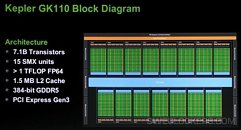- Joined
- Oct 9, 2007
- Messages
- 47,477 (7.50/day)
- Location
- Hyderabad, India
| System Name | RBMK-1000 |
|---|---|
| Processor | AMD Ryzen 7 5700G |
| Motherboard | ASUS ROG Strix B450-E Gaming |
| Cooling | DeepCool Gammax L240 V2 |
| Memory | 2x 8GB G.Skill Sniper X |
| Video Card(s) | Palit GeForce RTX 2080 SUPER GameRock |
| Storage | Western Digital Black NVMe 512GB |
| Display(s) | BenQ 1440p 60 Hz 27-inch |
| Case | Corsair Carbide 100R |
| Audio Device(s) | ASUS SupremeFX S1220A |
| Power Supply | Cooler Master MWE Gold 650W |
| Mouse | ASUS ROG Strix Impact |
| Keyboard | Gamdias Hermes E2 |
| Software | Windows 11 Pro |
NVIDIA's next high-end graphics card, the GeForce "Titan" 780, is shaping up to be a dreadnought of sorts. It reportedly ships with 6 GB of GDDR5 memory as its standard amount. It's known from GK110 block diagrams released alongside the Tesla K20X GPU compute accelerator, that the chip features a 384-bit wide memory interface. With 4 Gbit memory chips still eluding the mainstream, it's quite likely that NVIDIA could cram twenty four 2 Gbit chips to total up 6,144 MB, and hence the chips could be spread on either sides of the PCB, and the back-plate could make a comeback on NVIDIA's single-GPU lineup.
On its Radeon HD 7900 series single-GPU graphics cards based on the "Tahiti" silicon (which features the same memory bus width), AMD used 3 GB as the standard amount; while 2 GB is standard for the GeForce GTX 680; although non-reference design 4 GB and 6 GB variants of the GTX 680 and HD 7970, respectively, are quite common. SweClockers also learned that NVIDIA preparing to price the new card in the neighborhood of $899.

View at TechPowerUp Main Site
On its Radeon HD 7900 series single-GPU graphics cards based on the "Tahiti" silicon (which features the same memory bus width), AMD used 3 GB as the standard amount; while 2 GB is standard for the GeForce GTX 680; although non-reference design 4 GB and 6 GB variants of the GTX 680 and HD 7970, respectively, are quite common. SweClockers also learned that NVIDIA preparing to price the new card in the neighborhood of $899.

View at TechPowerUp Main Site





